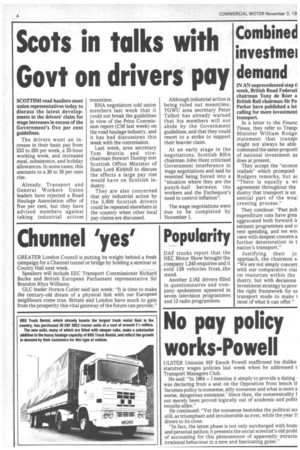Scots in talks with Govt on drivers pay
Page 6

If you've noticed an error in this article please click here to report it so we can fix it.
SCOTTISH road hauliers meet union representatives today to discuss the latest developments in the drivers' claim for Wage increases in excess of the Government's five per cent guidelines.
The drivers want an increase in their basic pay from £53 to £65 per week, a 35-hour working week, and increased meal, subsistence, and holiday allowances. In some cases, this amounts to a 20 to 30 per cent rise.
Already, Transport and General Workers Union leaders have rejected a Road Haulage Association offer of five per cent, but they have advised members against taking industrial actiom meantime.
RHA negotiators told union members last week that it could not break the guidelines• in view of the Price Commis-. sion report (CM last week) on the road haulage industry, and it has had discussions this week with the commission.
Last week, area secretary Tom Brattin and vicechairman Stewart Dunlop met Scottish Office Minister of State Lord Kirkhill to discuss the effects a large pay rise would have on Scottish industry.
They are also concerned that any industrial action by the 5,000 Scottish drivers could be repeated elsewhere in the country when other local pay claims are discussed. Although industrial action is being ruled out meantime, TGWU area secretary Peter Talbot has already warned that his members will not abide by the Government guidelines, and that they could resort to a strike to support their heavier claim.
At an early stage in the negotiations, Scottish RHA chairman John Hunt criticised Government interference in wage negotiations and said he resented being forced into a "situation where they are the punch-ball between the workers and the Exchequor's need to control inflation".
The wage negotiations were due to be completed by November 1.




























































































































